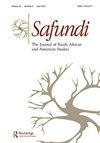“别告诉我这一切都不相关,以一种全新的老方式”:想象,激动,以及对阿里·史密斯的《春天》中的机器的愤怒
IF 0.2
Q4 AREA STUDIES
Safundi-The Journal of South African and American Studies
Pub Date : 2020-07-02
DOI:10.1080/17533171.2020.1776961
引用次数: 2
摘要
本文探讨了阿里·史密斯四季四重奏中的第三部小说《春天》。我以阿基利·姆本贝(Achille Mbembe)的《死亡政治》(Necropolitics)为概念框架,分析了史密斯对英国在跨国民粹主义时代应对脱欧的描绘。与《秋冬》一样,史密斯的散文充满了对流行文化和“高雅”文化的互文借用,也质疑了“纳米种族主义”与“免疫与社区”之间的联系(迪莱特)。本文将《春天》与史密斯对难民故事项目的贡献和倡导一起阅读,该项目涉及围绕移民、仇外心理和无限期拘留的各种话语。史密斯的作品用修辞和物质暴力追溯了我们民粹主义当下的黑暗,以及创造性回应和抵抗的可能性。我认为,到目前为止,她的季节性四重奏以及她与《难民故事》合作的作品在美学和道德上捍卫了一个原则,即人类的尊严,无论是个人的还是集体的,都取决于讲故事的能力。本文章由计算机程序翻译,如有差异,请以英文原文为准。
“Don’t tell me this isn’t relevant all over again in its brand new same old way”: imagination, agitation, and raging against the machine in Ali Smith’s Spring
ABSTRACT This paper explores the third novel in Ali Smith’s seasonal quartet, Spring. Using Achille Mbembe’s Necropolitics as a conceptual frame, I analyze Smith’s rendering of a Britain grappling with Brexit in times of transnational populism. As with Autumn and Winter, Smith’s prose is saturated with intertextual borrowings from pop and “high” culture, also interrogating the links between “nanoracism” and the “immunity and community” knot (Dillet). This paper reads Spring alongside Smith’s contribution to and advocacy of the Refugee Tales project regarding the diverse discourses surrounding migration, xenophobia, and indefinite detention. Smith’s writing traces the darkness of our populist present with its rhetorical and material violence, as well as the possibilities for creative response and resistance. I argue that her seasonal quartet to date and her work with Refugee Tales aesthetically and ethically defend the principle that human dignity, both individual and collective, rests on the ability to tell stories.
求助全文
通过发布文献求助,成功后即可免费获取论文全文。
去求助
来源期刊
CiteScore
1.00
自引率
0.00%
发文量
0

 求助内容:
求助内容: 应助结果提醒方式:
应助结果提醒方式:


